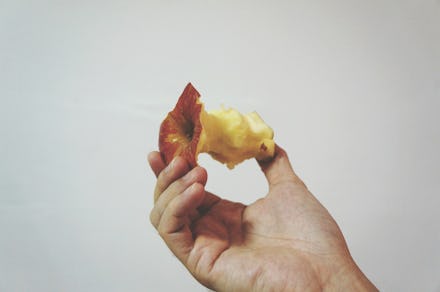Don't even think about throwing apple cores out of your car window

Apple cores tossed out of car windows are ruining native apple trees in Scotland, according to a study by researchers at the Royal Botanic Gardens in Edinburgh. In an article reported by The Telegraph, a team of scientists found that more than half of the apple trees growing along the M9 and A9 highways in Scotland were grown from non-native, supermarket apples. In total, about 30 percent of 'wild' apple trees in the country are actually hybrids.
The team, led by molecular biologist Dr. Markus Ruhsam, conducted genetic testing on apple trees throughout Scotland. Most wild apple trees are in woodland areas that haven't been greatly touched by human development. In populated places, like residential homes or highways, pollen from amateur gardeners planting non-native apple trees in their yard have traveled to create hybrid trees. While this can be bad news for the wild trees — the hybrid genes can eventually propagate enough to remove pure wild apple trees from the environment — Dr. Ruhsam didn't pin the blame on gardeners too much.
"I wouldn’t want to discourage people from planting apple trees in their gardens," he said to The Telegraph. "What I would like to discourage is people randomly planting apple trees in the wild. We want to keep wild apples wild." To that end, he encourages people to stop "chucking your apple core out of the window." A practice that he's "guilty of [...] as well."
Despite how natural and biodegradable apple cores are, most of the people tossing them aside likely didn't intend to introduce them into the area as an invasive species. But accidents like this isn't entirely unheard off — other well-intended folks have invited invasive species' into their ecosystem.
In the Midwest and Northeast United States, for example, invasive species of earthworms have spread due to residents using worms as part of their compost. According to the University of New Hampshire, composts that contain these earthworms — notably the species casually called the 'Jumping Worm' — sometimes end up accidentally spreading them to forested areas. Although earthworms are known to be useful in composts and gardens, they aren't so useful in forests. The University of New Hampshire says that the worms end up eating the nutritious top layer of the soil, leaving less for the seeds of native plants and trees to germinate from.
Invasive worms have also spread due to fishermen dumping their bait in the water after use. According to Great Lakes Worm Watch, the worms cannot drown and are better off being tossed into the trash instead.
A lot of native species are spread unknowingly, but it doesn't mean there's little that can be done about it. The Alliance for Chesapeake Bay recommends taking steps to ensure you don't contribute to spreading invasive species, and to keep yourself informed about the native and non-native species in your local area. And that might just mean keeping your cores, worms, and other waste with you until you can find the best way to dispose of them.